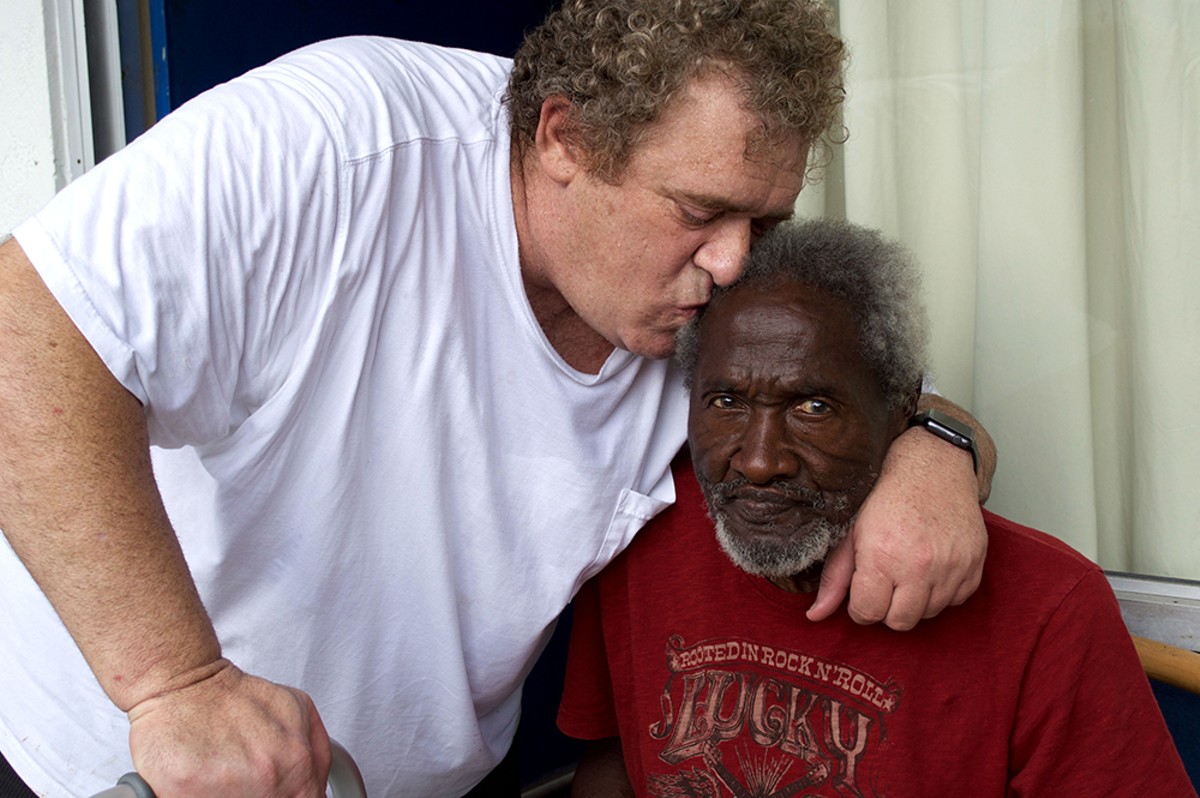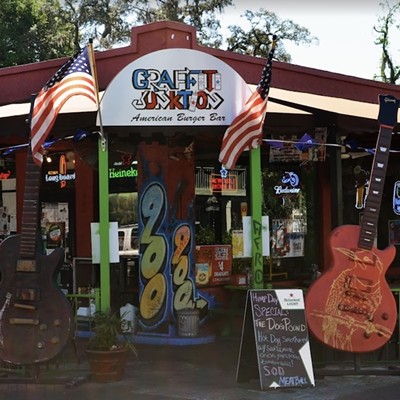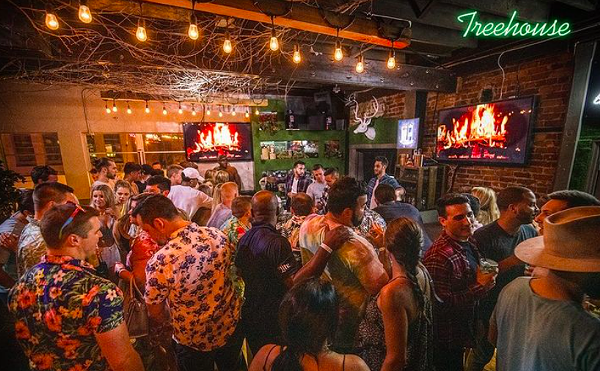Sean Cononie is dozing off mid-sentence again.
The founder of the COSAC Foundation, which offers services to homeless individuals, has gotten about two to three hours of sleep each night for weeks after moving to the outskirts of Haines City, a municipality in Polk County about 40 miles from Orlando. He makes an honest attempt each night to get some rest, but sooner or later his cellphone pings or someone wakes him up to handle an issue that has arisen for the homeless people who live at his Stay Plus Inn on U.S. Highway 27.
The 51-year-old runs on cigarettes and Nestea iced teas as he deals with minor matters, like a disabled resident not charging his electric wheelchair, to major ones, like the relationship between his "homeless resort" and local officials. Toward the end of the day, he's exhausted, but he wouldn't change a thing.
"At least 10 times a day my staff and I will look at each other in awe, thinking, why are we doing this?" he says. "This is where I'm supposed to be."
Cononie moved to Polk County in April, bringing with him 112 homeless people from Hollywood after the South Florida city paid him $4.8 million to leave town. It purchased the homeless shelter he was running there, much to the city's consternation, and banned him from moving back for the next 30 years. Equal parts abrasive and loving, Cononie did for many years what other shelters in South Florida could not – like take in, sometimes for free, people who are too old or too poor, chronically homeless, people with mental disabilities, those who have been kicked out of other shelters or who have addiction problems. The shelter he ran in Hollywood, Cononie says, was self-sufficient and used zero tax dollars. It paid its bills by having homeless people sell Cononie's newspaper, The Homeless Voice, on street corners.
Hollywood wanted Cononie out ever since he converted a former nudist hotel into a homeless shelter in 2002, and the city unsuccessfully sued him in an effort to shut the shelter down. He settled with the city this year and bought the 125-room Stay Plus Inn, located in unincorporated Polk County, because he liked the facility and the $2 million price tag. He calls his hotel a "homeless resort" and provides low-income housing, ranging from free to $24 per day, to his guests.
But since he's gotten here, there have been various issues with Polk County officials, issues that seemed to have started before he even arrived.
Cononie says he was greeted with food baskets and invitations to lunch for the first couple of days after he arrived, but then his residents told him Polk County Sheriff's Office deputies were stopping them, asking them how much they paid to Cononie from their incomes.
"Before we got here, they were already claiming we were doing human trafficking," he says. "I thought that this being a very Christian county and Sheriff Grady Judd being a Christian, they would be a little more welcoming."
On May 1, Cononie says a resident at the inn called for an ambulance that arrived quickly, but when he called one a little while later for a resident who was in his office having a hard time breathing, a Haines City ambulance arrived and sat in his parking lot for more than 30 minutes.
Both Haines City's City Manager Jonathan Evans and the city's public safety director, Rick Sloan, say the ambulance was told by the county dispatching services not to enter the building. Carrie Eleazer Horstman, spokeswoman for the Polk County Sheriff's Office, said the ambulance was staged nearby in the parking lot for 37 minutes because they were waiting to be cleared to go in by dispatch. The call taker, she says, heard someone was causing a disturbance, creating a dangerous situation.
Since Cononie moved to the area, Sloan says there have been 102 calls to the property, including 67 calls for service and 35 calls for emergency services.
In late July, the local newspaper, The Ledger, published a piece in which it reported that a former resident family of the homeless resort said Cononie was taking advantage of them by using their Social Security income and food stamps to pay for his services. (This reporter used to work for Ledger Media Group, which owns both The Ledger and the Winter Haven News Chief.) Local homeless organizations like the Homeless Coalition of Polk County and Tri-County Human Services told the paper they would not send people to Cononie until they figured out what he was doing.
Cononie says it's a common practice for shelters to ask people to pay a program fee, and Jacque Henderson, a director of Tri-County Human Services who was quoted in the original story, says pretty much every shelter or assisted living facility in the county collects some type of income from their clients.
Henderson and Dr. Tony Fusaro, executive director of the Talbot House Ministries in Lakeland, both said the Polk County Sheriff's Office told homeless organizations during a meeting that it was "investigating" Cononie, though so far, no criminal charges have been filed. Horstman says she can't confirm or deny if there's an investigation into the inn.
The situation took a further turn on June 26, when someone filed an anonymous complaint with the Agency for Health Care Administration.
"During a follow-up visit at the unlicensed facility, state Department of Children and Families staff were informed that untrained staff members of the Stay Plus Motel/Homeless Shelter/Extended Living Facility were providing care for at least four other residents who were unable to take care of themselves," the complaint says. "This care included: passing medications, insulin injections, bathing, transfers, as well as management of meals, finances and health care."
AHCA sent Cononie a letter on Aug. 4 telling him the agency determined he was operating an unlicensed assisted living facility and the penalties could include a $1,000 fine for each day he provides care for residents, or a possible injunction to restrain him. Cononie's lawyer, John David, sent the agency a response stating that the guests retain and pay for their personal caretakers themselves, something that doesn't need a license. AHCA press secretary Shelisha Coleman says that providing one or more personal-care services, such as the administration of medication on a 24-hour basis, classifies Cononie's hotel as an assisted living facility.
Cononie says agency investigators told him, among other things, that he could not give residents an aspirin, change someone's sheets if they urinate in bed or allow residents to have their blood pressure checked. He also says that by the same standards, homeless shelters that control their residents' medication would also be classified as assisted living facilities.
"You start to question yourself," Cononie says. "You start asking yourself if you're doing anything right when you're getting this type of heat from everybody. ... I just want to do my job."
Donald Whitehead, director of men's services at the Coalition for the Homeless of Central Florida, says he has known Cononie for almost 15 years.
"I think he's one of the most caring advocates I've ever known," he says. "The reason I say that is because he's willing to work with people who don't fit into the norm, people with more severe issues than your general homeless population. He's a person always willing to have compassion for those hardest to serve."
Whitehead also says the Department of Housing and Urban Development has told homeless organizations across the county to focus on putting more people directly into housing, rather than transitional services, which is exactly what Cononie is doing.
"Polk County should be finding ways to assist Sean because he's a valuable resource to the community and in the long run will save them money," he says. "It's more of a not-in-my-backyard issue. People don't want to take care of the homeless and would rather criminalize them."
Cyndi Malvita likes to call the homeless resort a "hotel for hope," she says.
Malvita, who also runs an organization called Charlie's Angel Outreach in Palm Beach County, works with Cononie day and night helping residents with their issues. Last Monday, she was trying to get school supplies and backpacks for the 33 children who live at the inn.
The kids and their parents have bonded with the older residents, Cononie says, forming a tight-knit community in the short time they've lived together. "It's so cute," he says, "because you see the older people giving the kids advice, like 'Don't lay in that puddle because you could get ringworm,' or 'Go inside, there's a lightning storm.'"
Each room has two beds, a TV and a bathroom. It may not be much, but it represents dignity to many of the residents. Jeffrey Cohen shares one of those rooms with John Gilbert. Both of them are disabled. Cohen says he got here in May and likes it so far, but now that the state has stepped in, both of them are at a standstill with their care.
"I don't want to go to a nursing home," Cohen says. "I don't want to go to an assisted living facility. I found this place, and everything was going positive, but now it's negative."
At the peak of his frustration, Cononie puts out his cigarette and steps outside his office. A few feet away, the kids at the homeless resort have taken over the pool, swimming, playing and just being children. An ice cream truck pulls around the corner, and they scramble, wet feet slapping the pavement to reach the truck. Their parents and the other adults who are sitting on their porches come to the ice cream truck and get in line.
One small boy looks at the line and whispers to Cononie, "But we don't have any money for ice cream."
Cononie leads him to the truck and takes out his wallet.
"Don't worry," he says. "I do."



















